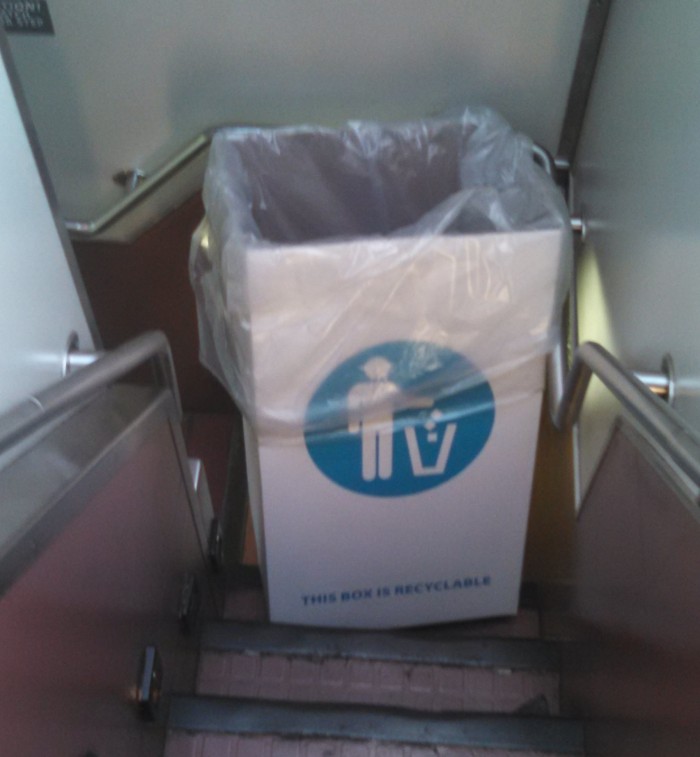Imagine What the Chief Would Say!
Riding from Minneapolis to Chicago on the Empire Builder recently, Fritz Plous, a former reporter with the Chicago Sun-Times who specializes in railroad issues, had what we can only hope was a first-and-last-time experience.

This photo, snapped by Fritz, illustrates the manner in which the Builder’s lounge car attendant on that trip chose to inform passengers that the café on the lower level of the lounge car was closed while she was taking a meal break. Fritz also reports that she made no P.A. announcement when she returned. The trash container, or its absence, was your first clue after walking through three cars if there would be anyone in the café to sell you a bag of chips and a can of Pepsi.
Twenty-five or so years ago, when I renewed my interest in traveling by Amtrak, there was a Chief of On-Board Services on every long-distance train. These men and women wore coats and ties—snappy blue blazers, actually—and they were responsible for the performance of the car attendants, the steward and servers in the dining car, and even the chef and the other workers in the kitchen.
The first chief I ever ran into was on the California Zephyr out of Chicago en route to the Bay Area. He came by our bedroom to introduce himself and make sure we were settled in all right. He called me by name—we were on his passenger manifest, of course—but he remembered it and greeted me as “Mr. Loomis” the next day when we passed him in the corridor on our way to the dining car. The onboard chiefs not only made the whole Amtrak experience seem extra special, but they made sure the rest of the onboard crew did their jobs the right way.
Of course it was just a matter of time before the people wearing the green eyeshades in Amtrak’s Accounting Department got rid of the chiefs and the dining car stewards to save money. But the interesting fact is, from that moment, the quality of service on an Amtrak long-distance train has pretty much depended on peer pressure and on each individual crew member performing his or her job conscientiously.
I try to remember that each of those folks is doing a tough job essentially with no supervision when I leave something on the table after a meal in the diner and when the car attendant helps me with my bags at my destination. It’s really quite remarkable when you stop and think about it.



The chief executive of Channel 4 has said that if the broadcaster was privatised it would need to make profits of about 200m annually and the TV schedule would need to be packed with entertainment shows and popular foreign-made hits to be commercially viable. The “fierce independence” of Channel 4’s news and current affairs coverage would also be under pressure under privatisation, the channel’s boss, David Abraham , told the House of Commons culture select committee on Tuesday.
I had a similar experience to Plous when riding the WB “Empire Builder” in October, 2012, minus the garbage can in the stairwell.. Boarding a 5 hour late #7 in Havre, MT on a Saturday night and grateful that my sleeper attendant had the wisdom to pull a dinner reservation for me, I went towards the cafe-lounge. As I walked down the stairs, I was greeted by a loud, shrieking LSA accusing me of not knowing “she was closed;” somehow expecting me to know that as I waited into the night on the platform. Frankly, over the years riding this great train, I have found a consistently huge difference in customer relations and attitude between the Chicago crew on the lounge and sleeper/coaches to Portland vs. the Seattle-based crew on the “Builder’s” diner and sleepers.
The issue over the red blazer Train Chiefs is parallel to the overall OBS crew issue–it has been, and remains, hit or miss. The only consistency is the inconsistent service. (Are we that removed from the days of Mr. Reed’s “Chiefs” or Mr. Budd’s “Builder”?) I remember some great Chiefs on the “Zephyr,” while there were many who hid in their roomette on the “Super Chief” and did nothing. As well, I heard of conflicts between those Chiefs and the conductors and to who was the real boss.
Perhaps we can still learn from the airlines how their flights continue to have a recognizable Purser, a person in charge. Only on the “Builder” does the diner LSA announce their position as the “steward,” so, we still have somebody in charge of that crew (although we have lost a certain command and control without a real steward). Again, I would reference those interested to see how VIA Rail Canada handles the situation–with a Service Director in charge of the entire train, and a (working) Service Manager in charge of the diner and lounges. By now, I think we have learned you cannot send a train on a transcontinental trip without some levels of authority and accountability.
I, too, rode the Zephyr 25 years ago when it had a Crew Chief. But my experience was not that pleasant. The Chief was a personable woman who took interest in my coast-to-coast and back journey to California. The steward of my car not so much. “Surly” would have been an improvement. He was openly hostile. He never made or unmade my bed, and when I moved to one side he accused me of trying to sneak into his room to steal things. I tried to tell the Chief, but she dismissed my complaints, saying she never had a problem with him. Well, I was certainly having problems, but she didn’t want to hear it! On the last day on the Zephyr, I put in a breakfast request the night before, and he completely ignored it! Now, he was giving service almost constantly to people at the other end of my sleeping car, so it’s not as if he completely shirked his duties. I went to the dining car and ordered breakfast, then I called the Crew Chief and requested that SHE bring it to my room, since the stewad in my car wouldn’t do it. I then told her of my total experience. She made the steward bring my breakfast to my room. When we arrived in Oakland, he was at the other end of the car, getting tips from the passengers he chose to serve. I had nothing for hi, since he had done NOTHING for me on the entire trip!
I fired off a letter to Amtrak about the whole sorry experience, and got a refund, since I did not get the first class experience I’d paid for. Whether those two employees ever got disciplined, I’ll never know. But if Amtrak’s Crew Chiefs were as ineffective as mine was, good riddance.